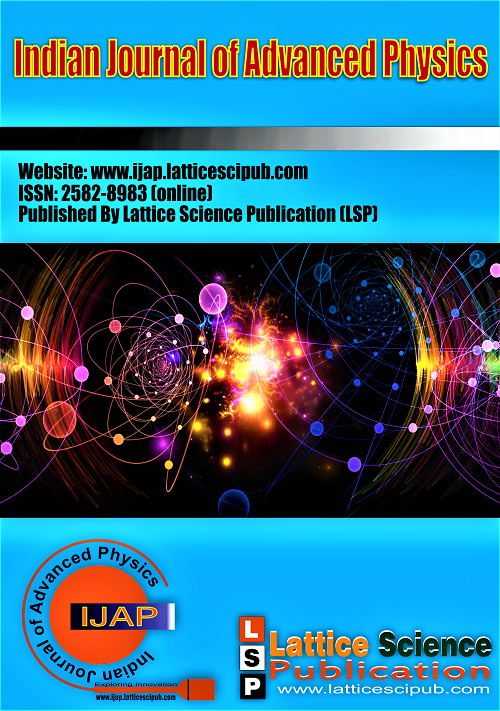Mung Seeds Under Constant Low Potential Difference During Post-Germination When Sprout Length Grows
Main Article Content
Abstract
Low potential difference 0.0Volt 1.5Volt, 3.0Volt, 4.5Volt, and 6.0Volt are applied during the growth of sprout length after germination and post-germination of mung seeds in open-air conditions. The sprout length decreases with an increase in potential difference and graphs show non-linear variations. Thus, this potential difference produces a negative impact on the sprout length elongation of seeds. The decrease in the sprout length may be due to lesser diffusion through the cell wall or due to the weakening of the activity of the other cell components leading to a slower rate of cell division. This may have an impact on the process of preservation of seeds.
Downloads
Article Details

This work is licensed under a Creative Commons Attribution-NonCommercial-NoDerivatives 4.0 International License.
How to Cite
References
A. Ghorai, The electrical hazards on the germination of seeds, LAP LAMBERT Academic Publishing AG & Co. KG, Germany, 2012, ISBN – NR 978-3-8465-0921-0.
Alok Chattaraj, Sandipan Mallik, Tapati Das and A. Ghorai, Physics Education 25.1 p.5,2008.
Anaranya Ghorai and A. Ghorai, World Journal of Biology and MedicalSciences, 2(3), 39-56, 2015.
A. Ghorai, Sk. Abdul Mohid and Sarif Khan, Research Journal of Agriculture and Environmental Management 3(9), 472-476, 2014.
G. H. Sidaway, Nature 211, 303, 1966. https://doi.org/10.1038/211303a0
B.B. Buchanan, W. Gruissem and R.L. Jones, Biochemistry and Molecular Biology of Plants, I.K. International Pvt. Ltd., Kolkata, 2000,
p.1041.
L. Taiz and E. Zeiger, Plant Physiology, Sinauer Associates Inc. USA, 4th ed. 2006, p.719. 8. Physiology, Productivity and Cotton Plant Adaptation under the
Conditions of Soil Salinity. (2019). In International Journal of Recent Technology and Engineering (Vol. 8, Issue 2S3, pp. 1611–1613).
https://doi.org/10.35940/ijrte.b1293.0782s319
Widowati, H., Sulistiani, W. S., Sutanto, A., Huda, M., & Rosman, A. S. (2019). The Effect of Washing and Processing of PB-Polluted
Vegetables towards their Levels of PB and Vitamin C. In International Journal of Innovative Technology and Exploring Engineering (Vol. 8,
Issue 11, pp. 1735–1739). https://doi.org/10.35940/ijitee.k1528.0981119
Sapate, N. M., & Deshmukh, Dr. R. R. (2019). Spectral and Numerical Analysis of Hyper spectral Data using Vegetation Indices. In
International Journal of Engineering and Advanced Technology (Vol. 8, Issue 6, pp. 2156–2162). https://doi.org/10.35940/ijeat.f8578.088619
Kindie, B., & Mengistu, S. (2022). Agro morphological Trait Evaluation of Garlic (Allium Sativum L.) Response to Fertilizer. In Indian Journal
of Advanced Botany (Vol. 2, Issue 1, pp. 1–5). https://doi.org/10.54105/ijab.a1014.042122
Natesan, Dr. B., Paneerselvam, U., & Narayanasamyc, Dr. D. (2022). Cyanotis Ceylanica Hassk. (Commelinaceae), First Record to India from
Eastern Ghats of Tamil Nadu, India. In Indian Journal of Advanced Botany (Vol. 2, Issue 2, pp. 1–4). https://doi.org/10.54105/ijab.d2008.102222





